高考高频语法点:定语从句
图片预览
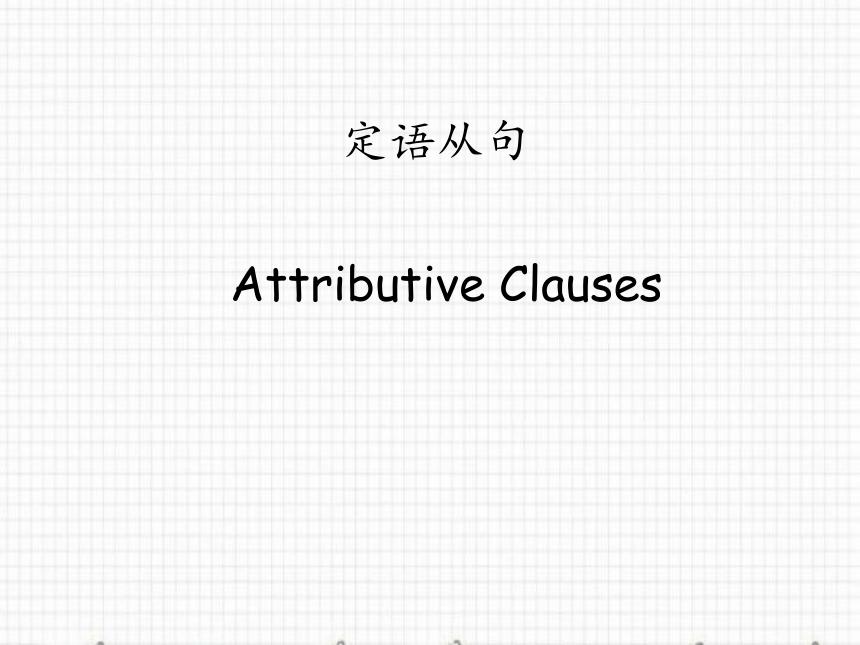

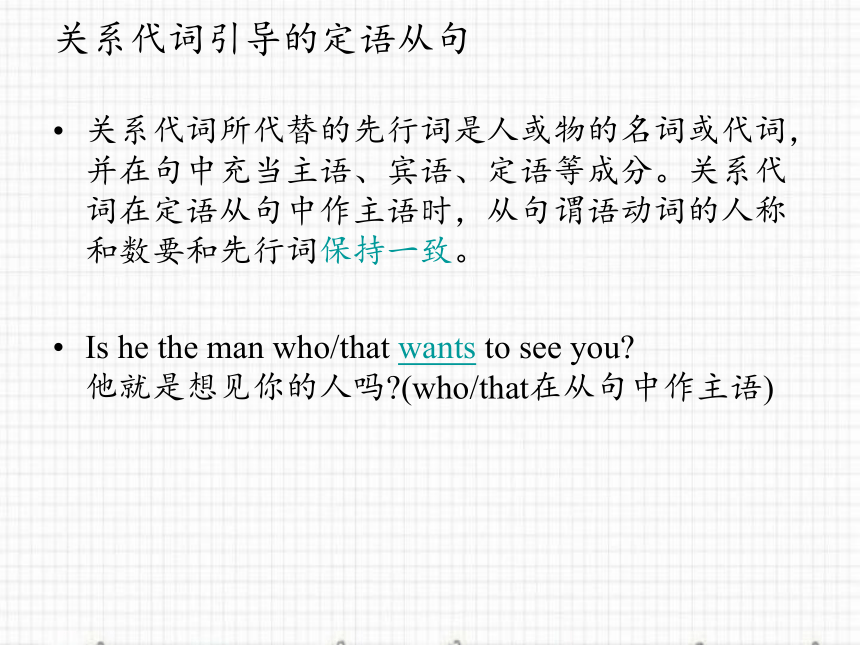
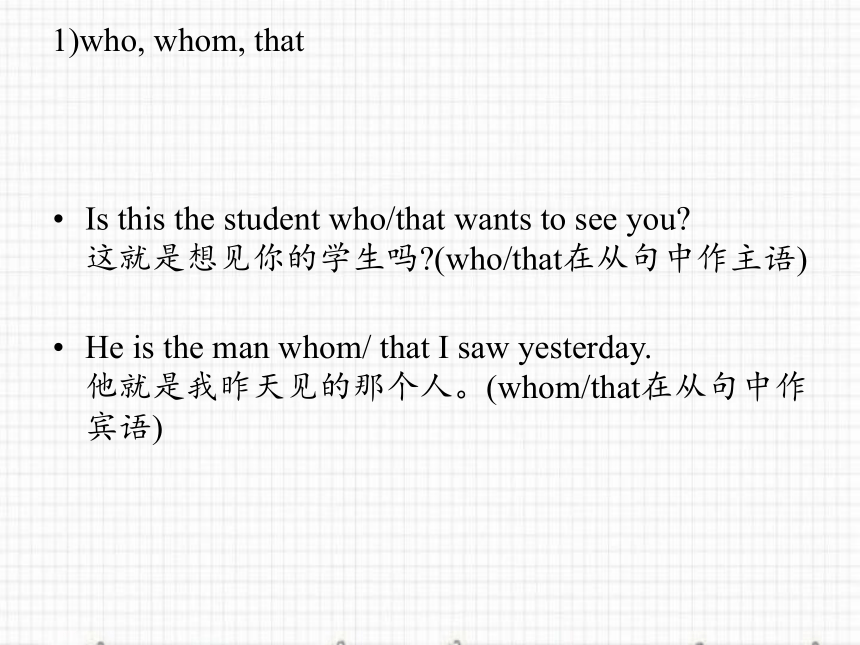
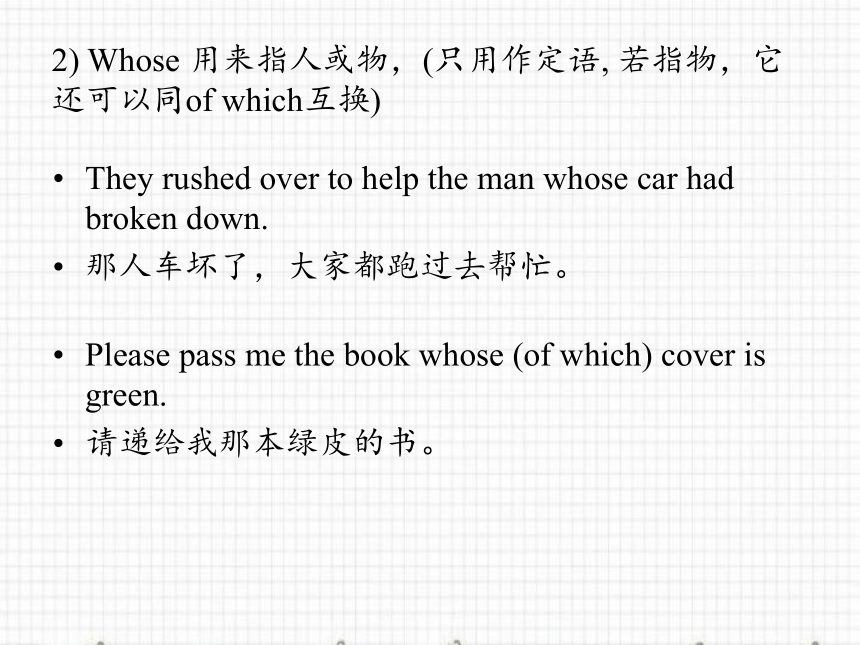
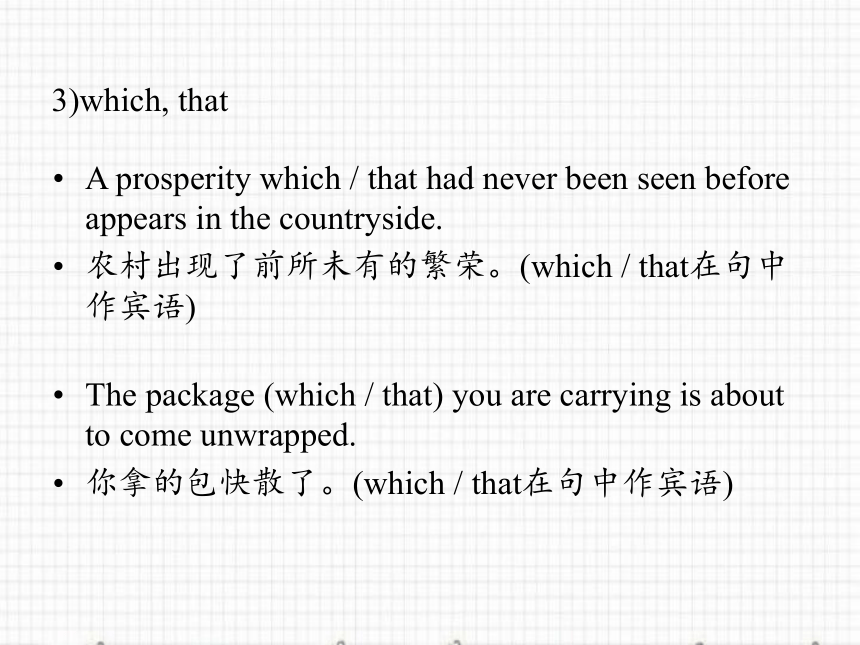
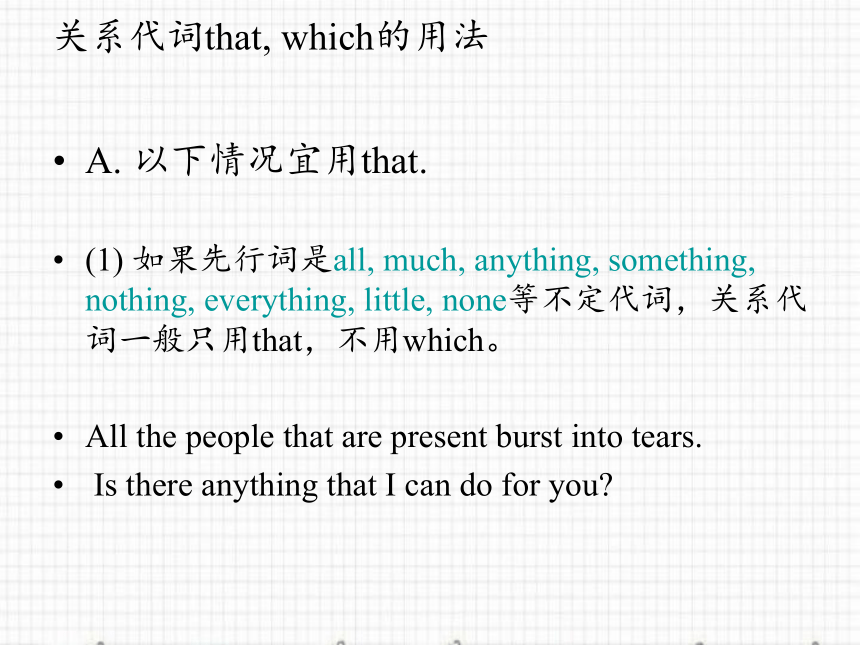
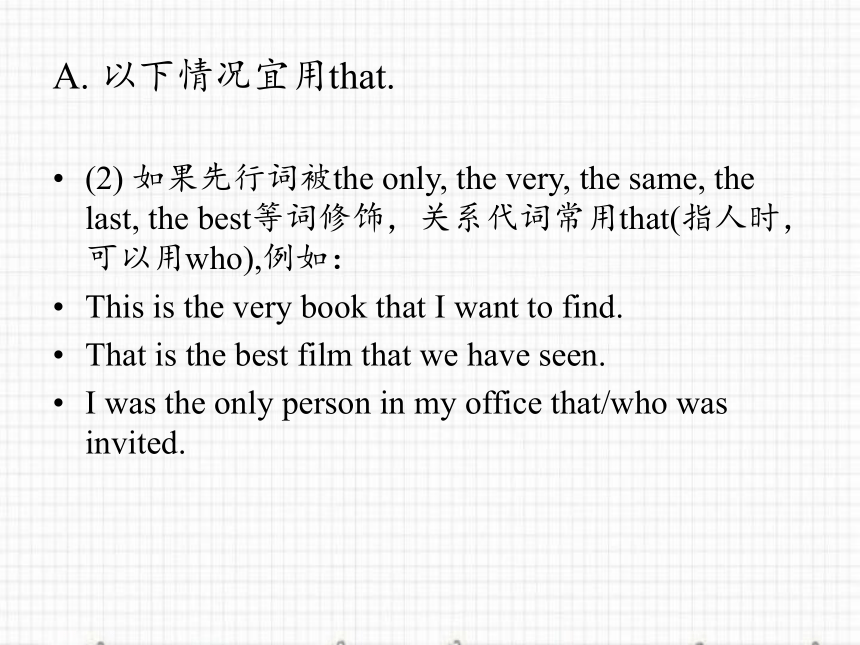
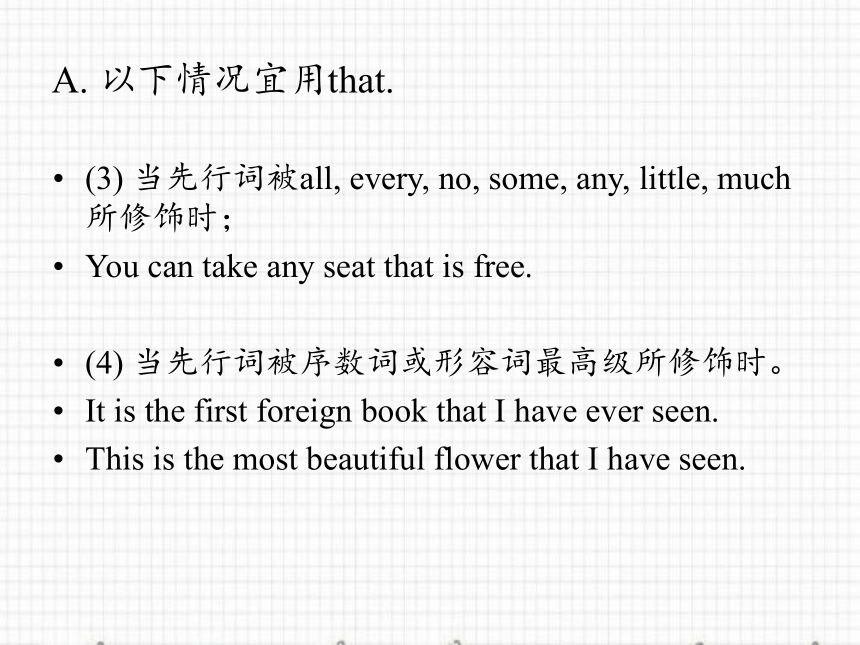
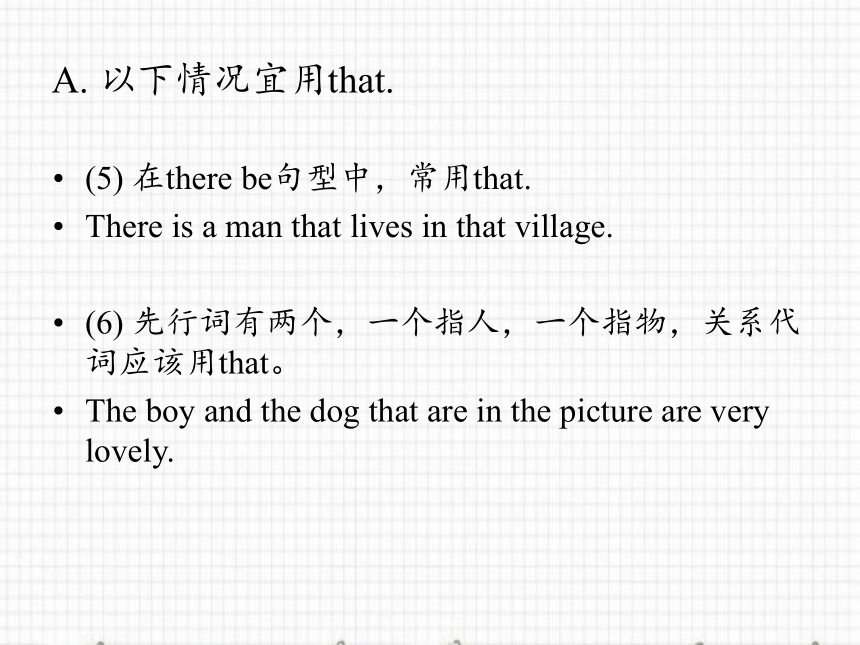
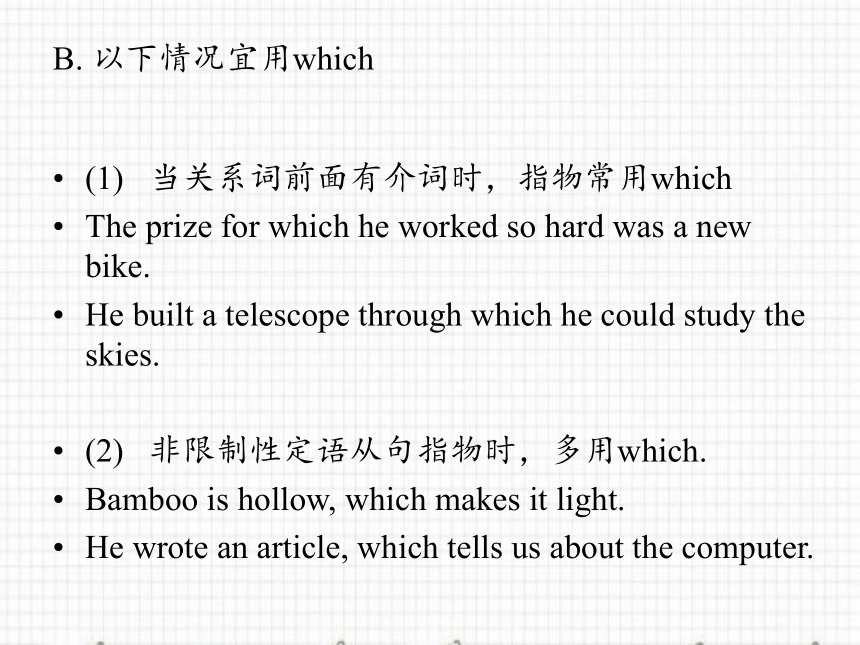
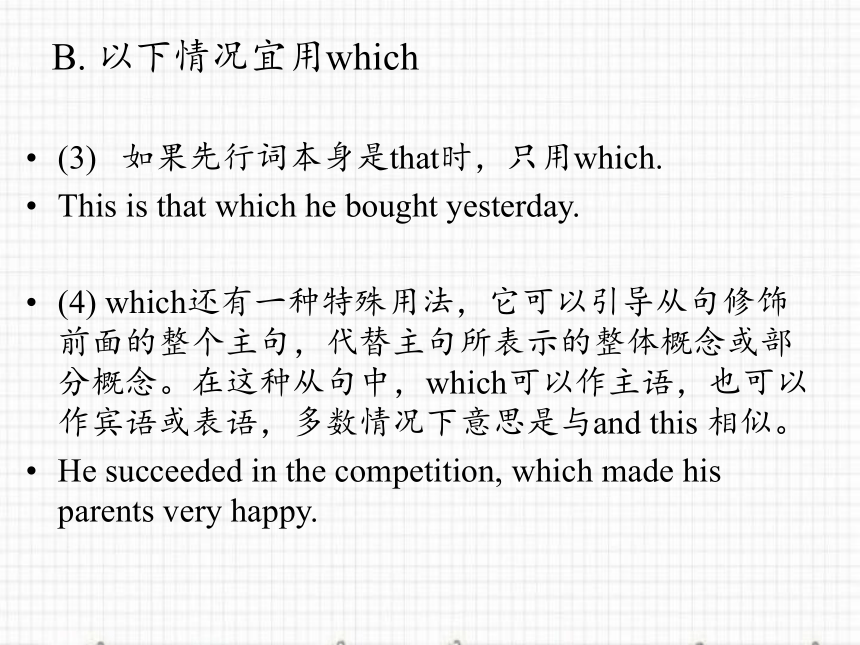
文档简介
(共44张PPT)
定语从句
Attributive Clauses
什么是定语从句?
定语从句在句中做定语,修饰一个名词或代词,被修饰的名词,词组或代词即先行词。定语从句通常出现在先行词之后,由关系词(关系代词或关系副词)引出。
关系代词有:who, whom, whose, that, which等
关系副词有:when, where, why等。
关系代词引导的定语从句
关系代词所代替的先行词是人或物的名词或代词,并在句中充当主语、宾语、定语等成分。关系代词在定语从句中作主语时,从句谓语动词的人称和数要和先行词保持一致。
Is he the man who/that wants to see you 他就是想见你的人吗 (who/that在从句中作主语)
1)who, whom, that
Is this the student who/that wants to see you 这就是想见你的学生吗 (who/that在从句中作主语)
He is the man whom/ that I saw yesterday. 他就是我昨天见的那个人。(whom/that在从句中作宾语)
2) Whose 用来指人或物,(只用作定语, 若指物,它还可以同of which互换)
They rushed over to help the man whose car had broken down.
那人车坏了,大家都跑过去帮忙。
Please pass me the book whose (of which) cover is green.
请递给我那本绿皮的书。
3)which, that
A prosperity which / that had never been seen before appears in the countryside.
农村出现了前所未有的繁荣。(which / that在句中作宾语)
The package (which / that) you are carrying is about to come unwrapped.
你拿的包快散了。(which / that在句中作宾语)
关系代词that, which的用法
A. 以下情况宜用that.
(1) 如果先行词是all, much, anything, something, nothing, everything, little, none等不定代词,关系代词一般只用that,不用which。
All the people that are present burst into tears.
Is there anything that I can do for you
A. 以下情况宜用that.
(2) 如果先行词被the only, the very, the same, the last, the best等词修饰,关系代词常用that(指人时,可以用who),例如:
This is the very book that I want to find.
That is the best film that we have seen.
I was the only person in my office that/who was invited.
A. 以下情况宜用that.
(3) 当先行词被all, every, no, some, any, little, much所修饰时;
You can take any seat that is free.
(4) 当先行词被序数词或形容词最高级所修饰时。
It is the first foreign book that I have ever seen.
This is the most beautiful flower that I have seen.
A. 以下情况宜用that.
(5) 在there be句型中,常用that.
There is a man that lives in that village.
(6) 先行词有两个,一个指人,一个指物,关系代词应该用that。
The boy and the dog that are in the picture are very lovely.
B. 以下情况宜用which
(1) 当关系词前面有介词时,指物常用which
The prize for which he worked so hard was a new bike.
He built a telescope through which he could study the skies.
(2) 非限制性定语从句指物时,多用which.
Bamboo is hollow, which makes it light.
He wrote an article, which tells us about the computer.
(3) 如果先行词本身是that时,只用which.
This is that which he bought yesterday.
(4) which还有一种特殊用法,它可以引导从句修饰前面的整个主句,代替主句所表示的整体概念或部分概念。在这种从句中,which可以作主语,也可以作宾语或表语,多数情况下意思是与and this 相似。
He succeeded in the competition, which made his parents very happy.
B. 以下情况宜用which
C. 以下情况宜用who
(1)先行词是one, ones, anyone等不定代词且指人时。
One who has nothing to fear for oneself dares to tell the truth.一个无所畏惧的人敢于说实话。
(2)先行词是those且指人时.
This is because in the early days of radio, those who reported the news were expected to speak excellent English.
三、 关系副词引导的定语从句:关系副词可代替的先行词是时间、地点或理由的名词,在从句中作状语。
1)when, where, why
关系副词when, where, why的含义相当于“介词+ which”结构,因此常常和“介词+ which”结构交替使用。
There are occasions when (on which) one must yield. 任何人都有不得不屈服的时候。
1)when, where, why
Beijing is the place where (in which) I was born.
北京是我的出生地。
Is this the reason why (for which) he refused our offer
这就是他拒绝我们帮助他的理由吗?
2)that代替关系副词
that可以用于表示时间、地点、方式、理由的名词后取代when, where, why和“介词+ which”引导的定语从句,在口语中that常被省略。
He is unlikely to find the place (that / where / in which) he lived forty years ago.
他不大可能找到他四十年前居住过的地方。
This is the reason he was absent.
2)that代替关系副词
His father died the year (that / when / in which) he was born. 他父亲在他出生那年逝世了。
I don’t like the way (that/ in which) he was treated.
我不喜欢别人这样对待他。
四、判断关系代词与关系副词
方法一:用关系代词,还是关系副词完全取决于从句中的谓语动词。及物动词后面无宾语,就必须要求用关系代词;而不及物动词则要求用关系副词。
This is the mountain village where I stayed last year.
This is the mountain village which I visited last year.
I'll never forget the days when I worked together with you.
I'll never forget the days which I spent in the countryside.
方法二: 准确判断先行词在定语从句中的成分(主、谓、宾、定、状),也能正确选择出关系代词/关系副词。
例1. Is this museum ___ you visited a few days age A. where B. that C. on which D. the one
例2 Is this the museum ____ the exhibition was held. A. where B. that C. on which D. the one
总结:关系词的选择依据在从句中所做的成分,先行词在从句中做主、定、宾语时,选择关系代词 (who, whom, that, which, whose); 先行词在从句中做状语时,应选择关系副词 ( where 地点状语,when 时间状语,why 原因状语) 。
五、限制性和非限制性定语从句
1) 限制性定语从句是先行词不可缺少的部分,去掉它主句意思往往不明确;非限制性定语从句是先行词的附加说明,去掉了也不会影响主句的意思,它与主句之间通常用逗号分开。
This is the house which we bought last month. 这是我们上个月买的那幢房子。(限制性)
The house, which we bought last month, is very nice. 这幢房子很漂亮,是我们上个月买的。(非限制性)
2) 当先行词是专有名词或物主代词和指示代词所修饰时,其后的定语从句通常是非限制性的
Charles Smith, who was my former teacher, retired last year。查理 史密斯去年退休了,他曾经是我的老师。
My house, which I bought last year, has got a lovely garden. 我去年买的的那幢房子带着个漂亮的花园。
This novel, which I have read three times, is very touching. 这本小说很动人,我已经读了三遍。
3) 非限制性定语从句还能将整个主句作为先行词, 对其进行修饰, 这时从句谓语动词要用第三人称单数 。
He seems not to have grasped what I meant, which greatly upsets me. 他似乎没抓住我的意思,这使我心烦。
Liquid water changes to vapor, which is called evaporation. 液态水变为蒸汽,这就叫做蒸发。
说明:关系代词that和关系副词why不能引导非限制性定语从句。
六、介词+关系词
(1) “介词+关系代词“可以引导限制性定语从句,也可以引导非限制性定语从句。“介词+关系代词“结构中的介词可以是 in, on, about, from, for, with, to at, of, without 等,关系代词只可用whom或 which,不可用 that。
This is the house in which I lived two years ago.
Do you remember the day on which you joined our club
介词+关系词
(2) from where为“介词+关系副词“结构,但也可以引导定语从句。
We stood at the top of the hill, from where we can see the town.
(3) 像listen to, look at, depend on, pay attention to, take care of等固定短语动词,在定语从句中一般不宜将介词与动词分开。
This is the boy whom she has taken care of.
介词+关系词
(4) 某些在从句中充当时间,地点或原因状语的“介词+关系词”结构可以同关系副词when 和where 互换。
This is the house where I lived two years ago.
Do you remember the day when you joined our club
(5) Some, any, none等或数词+of which/whom 引导的定语从句。 I have four books, two of which are interesting.
七、as, which非限定性定语从句
关系代词as也可引导非限制性定语从句,其从句的谓语常是表示感知的动词,如:know, see, hear, expect等。从句可放在主句之前、之中、或之后。As可以指主句中的某个成分,也可以指整个主句,as在从句中可以作主语、宾语或表语。
Tom, as you know, is a writer.
Tom doesn’t find his homework, as often happens.
Charlie looks strong, as in fact he is.
as, which非限定性定语从句
由as, which 引导的非限定性定语从句,as和which可代整个主句,相当于and this或and that。As一般放在句首,which在句中。
As we know, smoking is harmful to one's health.
The sun heats the earth, which is very important to us.
典型例题
1)Alice received an invitation from her boss, ___came as a surprise. A. it B. that C. which D. he
2)The weather turned out to be very good, ___ was more than we could expect. A. what B. which C. that D. it
3)It rained hard yesterday, ____ prevented me from going to the park.. A. that B. which C. as D. it
as 和which在引导非限制性定语从句的区别
as 和which在引导非限制性定语从句时,这两个关系代词都指主句所表达的整个意思,且在定语从句中都可以作主语和宾语。但不同之处主要有两点: (1) as 引导的定语从句可置于句首,而which不可。 (2) as 常作实义动词except, guess, hear, know, remember, see, say, show, tell, watch等的宾语,这类词与as几乎成了一种固定搭配;而which无此种固定搭配。
As we had expected, the parents' meeting worked out very well.
as 的用法
例1. the same… as;such…as 中的as 是一种固定结构, 和……一样……。
I have got into the same trouble as he (has).
例2. as可引导非限制性从句,常带有‘正如’。
As we know, smoking is harmful to one's health.
As is know, smoking is harmful to one's health.
八、定语从句与名词性从句的互换
定语从句和名词性从句由于表达意思的需要,有时可以互相转换。大致有下面三种情况: (1)定语从句与表语从句的互换
That‘s the thing that we’re worrying about.(定语从句)
That‘s what we’re worrying about.(表语从句)
This is the way she did it.
This is how she did it.
定语从句与名词性从句的互换
This is the reason why we must go now.
This is why we must go now.
That is the place where Xiao Lin was born.
That is where Xiao Lin was born.
(2)定语从句与宾语从句的互换
I don‘t know the reason why she is so happy.(定语从句)
I don‘t know why she is so happy.(宾语从句)
He showed me the place where he used to live.
He showed me where he used to live.
Do you know the date when Wuhan was liberated
Do you know when Wuhan was liberated
(3)定语从句与主语从句的互换
The thing that we need is more time.(定语从句) What we need is more time.(主语从句) The time when they will start out has not been decided yet. When they will start out has not been decided yet.
定语从句与宾语从句的互换
The reason why he did it wasn’t quite clear.
Why he did it wasn’t quite clear.
The place where she lives is not known yet.
Where she lives is not known yet.
九、学习定语从句应注意的几个问题
(1)定语从句中关系代词与先行词的一致性 定语从句中关系代词一般应与它所指代的先行词的单复数保持主谓一致。
The students who were here just now are from No,2 Senior Middle School.
但注意下列一组句子:
He is the only one of the students who was here just now.
He is one of the students who were here just now. 注意:如果"one of +复数名词"后跟有定语从句,一般情况下"one of"后的复数名词为先行词,但当one前有the only, the very, just the修饰时,先行词则为one。
(2)定语从句与强调结构
It is the place where they lived before.
It is in the place that they lived before.
解析:第一个句子为定语从句,where指代the place,在定语从句中作状语,第二个句子为强调结构,强调in the place, that没有意义,把in the place 放回后面句子,句子意思完整。
Where is it that he found the lost watch?
Where is the watch that he found yesterday.
(3)定语从句与并列结构
He has two sons, neither of whom looks like him.
He has two sons, and neither of them looks like him.
I‘ve got two sisters. Both of them are in Shanghai.
解析:第一个句子为定语从句,关系代词whom指代two sons,在定语从句中作介词of的宾语。第二个句子为并列结构,由并列连词and连接,人称代词them指代two sons。第三个为两个独立的句子,两个句子中间用句号,两句开头的处一个字母都大写。
(4)定语从句与状语从句
He found the books where he had put.
He found the books in the place where he had put.
解析:第一个句子为状语从句,where he had put 作主句He found the books 的地点状语。第二个句子为定语从句,where引导从句修饰the place。
This is such an interesting book that I'd like to read it.
This is such an interesting book as I'd like to read.
解析:第一个句子为结果状语从句,在结果状语从句中,it指代book,作read的宾语。第二个句子为定语从句,关系代词as指代先行词book的定语从句中read的宾语。
(5)定语从句中的先行词
Is this book the one that you bought yesterday
Is this the book that you bought yesterday
解析:第一个句子中,this book是主句的主语,the one 是先行词。在第二个句子中this是主句的主语,the book是先行词。
错例:Is this book that you bought yesterday
改正:Is this book what you bought yesterday?(﹀)
(6)定语从句与同位语从句
定语从句相当于形容词,它对先行词起修饰、描述或限制作用,而同位语从句则相当于名词,它对其前面的词给予说明或作进一步解释,即说明该词所表示的具体内容
The news that we heard is not true.(定语从句)
The news that he won the prize is not true.(同位语从句)
另:在“have no idea+从句”结构中,其从句都作idea的同位语。
I have no idea when she will be back.
十、把握定语从句中的时空概念
(1)从逻辑意义上讲,只有从句中的谓语动词与该先行词构成动状(时间、地点)关系时,才能用when或where引导从句;或视不同情况以prep. which代之。
This is the country where/in which Edison was born。(动状关系)
I'll never forget the year when/in which the terrible earthquake happened.(动状关系)
(2)从逻辑意义上看,当从句中的谓语动词与该类先行词有主谓关系或动宾关系时,则以which/that或prep. which引导从句。
Please follow the custom of the country which/that you are going to visit.(动宾关系)
For ever I'll remember the year that/which brought me happy memory.(主谓关系)
(3)从逻辑意义上讲,当从句中作主语的名词与先行词存在所属关系时,则用词whose。
Mr. Gallant is going to the country whose name is Sweden.(所属关系)
Generally, we refer to(指的是)the time whose speed is unchanged.(所属关系)
定语从句
Attributive Clauses
什么是定语从句?
定语从句在句中做定语,修饰一个名词或代词,被修饰的名词,词组或代词即先行词。定语从句通常出现在先行词之后,由关系词(关系代词或关系副词)引出。
关系代词有:who, whom, whose, that, which等
关系副词有:when, where, why等。
关系代词引导的定语从句
关系代词所代替的先行词是人或物的名词或代词,并在句中充当主语、宾语、定语等成分。关系代词在定语从句中作主语时,从句谓语动词的人称和数要和先行词保持一致。
Is he the man who/that wants to see you 他就是想见你的人吗 (who/that在从句中作主语)
1)who, whom, that
Is this the student who/that wants to see you 这就是想见你的学生吗 (who/that在从句中作主语)
He is the man whom/ that I saw yesterday. 他就是我昨天见的那个人。(whom/that在从句中作宾语)
2) Whose 用来指人或物,(只用作定语, 若指物,它还可以同of which互换)
They rushed over to help the man whose car had broken down.
那人车坏了,大家都跑过去帮忙。
Please pass me the book whose (of which) cover is green.
请递给我那本绿皮的书。
3)which, that
A prosperity which / that had never been seen before appears in the countryside.
农村出现了前所未有的繁荣。(which / that在句中作宾语)
The package (which / that) you are carrying is about to come unwrapped.
你拿的包快散了。(which / that在句中作宾语)
关系代词that, which的用法
A. 以下情况宜用that.
(1) 如果先行词是all, much, anything, something, nothing, everything, little, none等不定代词,关系代词一般只用that,不用which。
All the people that are present burst into tears.
Is there anything that I can do for you
A. 以下情况宜用that.
(2) 如果先行词被the only, the very, the same, the last, the best等词修饰,关系代词常用that(指人时,可以用who),例如:
This is the very book that I want to find.
That is the best film that we have seen.
I was the only person in my office that/who was invited.
A. 以下情况宜用that.
(3) 当先行词被all, every, no, some, any, little, much所修饰时;
You can take any seat that is free.
(4) 当先行词被序数词或形容词最高级所修饰时。
It is the first foreign book that I have ever seen.
This is the most beautiful flower that I have seen.
A. 以下情况宜用that.
(5) 在there be句型中,常用that.
There is a man that lives in that village.
(6) 先行词有两个,一个指人,一个指物,关系代词应该用that。
The boy and the dog that are in the picture are very lovely.
B. 以下情况宜用which
(1) 当关系词前面有介词时,指物常用which
The prize for which he worked so hard was a new bike.
He built a telescope through which he could study the skies.
(2) 非限制性定语从句指物时,多用which.
Bamboo is hollow, which makes it light.
He wrote an article, which tells us about the computer.
(3) 如果先行词本身是that时,只用which.
This is that which he bought yesterday.
(4) which还有一种特殊用法,它可以引导从句修饰前面的整个主句,代替主句所表示的整体概念或部分概念。在这种从句中,which可以作主语,也可以作宾语或表语,多数情况下意思是与and this 相似。
He succeeded in the competition, which made his parents very happy.
B. 以下情况宜用which
C. 以下情况宜用who
(1)先行词是one, ones, anyone等不定代词且指人时。
One who has nothing to fear for oneself dares to tell the truth.一个无所畏惧的人敢于说实话。
(2)先行词是those且指人时.
This is because in the early days of radio, those who reported the news were expected to speak excellent English.
三、 关系副词引导的定语从句:关系副词可代替的先行词是时间、地点或理由的名词,在从句中作状语。
1)when, where, why
关系副词when, where, why的含义相当于“介词+ which”结构,因此常常和“介词+ which”结构交替使用。
There are occasions when (on which) one must yield. 任何人都有不得不屈服的时候。
1)when, where, why
Beijing is the place where (in which) I was born.
北京是我的出生地。
Is this the reason why (for which) he refused our offer
这就是他拒绝我们帮助他的理由吗?
2)that代替关系副词
that可以用于表示时间、地点、方式、理由的名词后取代when, where, why和“介词+ which”引导的定语从句,在口语中that常被省略。
He is unlikely to find the place (that / where / in which) he lived forty years ago.
他不大可能找到他四十年前居住过的地方。
This is the reason he was absent.
2)that代替关系副词
His father died the year (that / when / in which) he was born. 他父亲在他出生那年逝世了。
I don’t like the way (that/ in which) he was treated.
我不喜欢别人这样对待他。
四、判断关系代词与关系副词
方法一:用关系代词,还是关系副词完全取决于从句中的谓语动词。及物动词后面无宾语,就必须要求用关系代词;而不及物动词则要求用关系副词。
This is the mountain village where I stayed last year.
This is the mountain village which I visited last year.
I'll never forget the days when I worked together with you.
I'll never forget the days which I spent in the countryside.
方法二: 准确判断先行词在定语从句中的成分(主、谓、宾、定、状),也能正确选择出关系代词/关系副词。
例1. Is this museum ___ you visited a few days age A. where B. that C. on which D. the one
例2 Is this the museum ____ the exhibition was held. A. where B. that C. on which D. the one
总结:关系词的选择依据在从句中所做的成分,先行词在从句中做主、定、宾语时,选择关系代词 (who, whom, that, which, whose); 先行词在从句中做状语时,应选择关系副词 ( where 地点状语,when 时间状语,why 原因状语) 。
五、限制性和非限制性定语从句
1) 限制性定语从句是先行词不可缺少的部分,去掉它主句意思往往不明确;非限制性定语从句是先行词的附加说明,去掉了也不会影响主句的意思,它与主句之间通常用逗号分开。
This is the house which we bought last month. 这是我们上个月买的那幢房子。(限制性)
The house, which we bought last month, is very nice. 这幢房子很漂亮,是我们上个月买的。(非限制性)
2) 当先行词是专有名词或物主代词和指示代词所修饰时,其后的定语从句通常是非限制性的
Charles Smith, who was my former teacher, retired last year。查理 史密斯去年退休了,他曾经是我的老师。
My house, which I bought last year, has got a lovely garden. 我去年买的的那幢房子带着个漂亮的花园。
This novel, which I have read three times, is very touching. 这本小说很动人,我已经读了三遍。
3) 非限制性定语从句还能将整个主句作为先行词, 对其进行修饰, 这时从句谓语动词要用第三人称单数 。
He seems not to have grasped what I meant, which greatly upsets me. 他似乎没抓住我的意思,这使我心烦。
Liquid water changes to vapor, which is called evaporation. 液态水变为蒸汽,这就叫做蒸发。
说明:关系代词that和关系副词why不能引导非限制性定语从句。
六、介词+关系词
(1) “介词+关系代词“可以引导限制性定语从句,也可以引导非限制性定语从句。“介词+关系代词“结构中的介词可以是 in, on, about, from, for, with, to at, of, without 等,关系代词只可用whom或 which,不可用 that。
This is the house in which I lived two years ago.
Do you remember the day on which you joined our club
介词+关系词
(2) from where为“介词+关系副词“结构,但也可以引导定语从句。
We stood at the top of the hill, from where we can see the town.
(3) 像listen to, look at, depend on, pay attention to, take care of等固定短语动词,在定语从句中一般不宜将介词与动词分开。
This is the boy whom she has taken care of.
介词+关系词
(4) 某些在从句中充当时间,地点或原因状语的“介词+关系词”结构可以同关系副词when 和where 互换。
This is the house where I lived two years ago.
Do you remember the day when you joined our club
(5) Some, any, none等或数词+of which/whom 引导的定语从句。 I have four books, two of which are interesting.
七、as, which非限定性定语从句
关系代词as也可引导非限制性定语从句,其从句的谓语常是表示感知的动词,如:know, see, hear, expect等。从句可放在主句之前、之中、或之后。As可以指主句中的某个成分,也可以指整个主句,as在从句中可以作主语、宾语或表语。
Tom, as you know, is a writer.
Tom doesn’t find his homework, as often happens.
Charlie looks strong, as in fact he is.
as, which非限定性定语从句
由as, which 引导的非限定性定语从句,as和which可代整个主句,相当于and this或and that。As一般放在句首,which在句中。
As we know, smoking is harmful to one's health.
The sun heats the earth, which is very important to us.
典型例题
1)Alice received an invitation from her boss, ___came as a surprise. A. it B. that C. which D. he
2)The weather turned out to be very good, ___ was more than we could expect. A. what B. which C. that D. it
3)It rained hard yesterday, ____ prevented me from going to the park.. A. that B. which C. as D. it
as 和which在引导非限制性定语从句的区别
as 和which在引导非限制性定语从句时,这两个关系代词都指主句所表达的整个意思,且在定语从句中都可以作主语和宾语。但不同之处主要有两点: (1) as 引导的定语从句可置于句首,而which不可。 (2) as 常作实义动词except, guess, hear, know, remember, see, say, show, tell, watch等的宾语,这类词与as几乎成了一种固定搭配;而which无此种固定搭配。
As we had expected, the parents' meeting worked out very well.
as 的用法
例1. the same… as;such…as 中的as 是一种固定结构, 和……一样……。
I have got into the same trouble as he (has).
例2. as可引导非限制性从句,常带有‘正如’。
As we know, smoking is harmful to one's health.
As is know, smoking is harmful to one's health.
八、定语从句与名词性从句的互换
定语从句和名词性从句由于表达意思的需要,有时可以互相转换。大致有下面三种情况: (1)定语从句与表语从句的互换
That‘s the thing that we’re worrying about.(定语从句)
That‘s what we’re worrying about.(表语从句)
This is the way she did it.
This is how she did it.
定语从句与名词性从句的互换
This is the reason why we must go now.
This is why we must go now.
That is the place where Xiao Lin was born.
That is where Xiao Lin was born.
(2)定语从句与宾语从句的互换
I don‘t know the reason why she is so happy.(定语从句)
I don‘t know why she is so happy.(宾语从句)
He showed me the place where he used to live.
He showed me where he used to live.
Do you know the date when Wuhan was liberated
Do you know when Wuhan was liberated
(3)定语从句与主语从句的互换
The thing that we need is more time.(定语从句) What we need is more time.(主语从句) The time when they will start out has not been decided yet. When they will start out has not been decided yet.
定语从句与宾语从句的互换
The reason why he did it wasn’t quite clear.
Why he did it wasn’t quite clear.
The place where she lives is not known yet.
Where she lives is not known yet.
九、学习定语从句应注意的几个问题
(1)定语从句中关系代词与先行词的一致性 定语从句中关系代词一般应与它所指代的先行词的单复数保持主谓一致。
The students who were here just now are from No,2 Senior Middle School.
但注意下列一组句子:
He is the only one of the students who was here just now.
He is one of the students who were here just now. 注意:如果"one of +复数名词"后跟有定语从句,一般情况下"one of"后的复数名词为先行词,但当one前有the only, the very, just the修饰时,先行词则为one。
(2)定语从句与强调结构
It is the place where they lived before.
It is in the place that they lived before.
解析:第一个句子为定语从句,where指代the place,在定语从句中作状语,第二个句子为强调结构,强调in the place, that没有意义,把in the place 放回后面句子,句子意思完整。
Where is it that he found the lost watch?
Where is the watch that he found yesterday.
(3)定语从句与并列结构
He has two sons, neither of whom looks like him.
He has two sons, and neither of them looks like him.
I‘ve got two sisters. Both of them are in Shanghai.
解析:第一个句子为定语从句,关系代词whom指代two sons,在定语从句中作介词of的宾语。第二个句子为并列结构,由并列连词and连接,人称代词them指代two sons。第三个为两个独立的句子,两个句子中间用句号,两句开头的处一个字母都大写。
(4)定语从句与状语从句
He found the books where he had put.
He found the books in the place where he had put.
解析:第一个句子为状语从句,where he had put 作主句He found the books 的地点状语。第二个句子为定语从句,where引导从句修饰the place。
This is such an interesting book that I'd like to read it.
This is such an interesting book as I'd like to read.
解析:第一个句子为结果状语从句,在结果状语从句中,it指代book,作read的宾语。第二个句子为定语从句,关系代词as指代先行词book的定语从句中read的宾语。
(5)定语从句中的先行词
Is this book the one that you bought yesterday
Is this the book that you bought yesterday
解析:第一个句子中,this book是主句的主语,the one 是先行词。在第二个句子中this是主句的主语,the book是先行词。
错例:Is this book that you bought yesterday
改正:Is this book what you bought yesterday?(﹀)
(6)定语从句与同位语从句
定语从句相当于形容词,它对先行词起修饰、描述或限制作用,而同位语从句则相当于名词,它对其前面的词给予说明或作进一步解释,即说明该词所表示的具体内容
The news that we heard is not true.(定语从句)
The news that he won the prize is not true.(同位语从句)
另:在“have no idea+从句”结构中,其从句都作idea的同位语。
I have no idea when she will be back.
十、把握定语从句中的时空概念
(1)从逻辑意义上讲,只有从句中的谓语动词与该先行词构成动状(时间、地点)关系时,才能用when或where引导从句;或视不同情况以prep. which代之。
This is the country where/in which Edison was born。(动状关系)
I'll never forget the year when/in which the terrible earthquake happened.(动状关系)
(2)从逻辑意义上看,当从句中的谓语动词与该类先行词有主谓关系或动宾关系时,则以which/that或prep. which引导从句。
Please follow the custom of the country which/that you are going to visit.(动宾关系)
For ever I'll remember the year that/which brought me happy memory.(主谓关系)
(3)从逻辑意义上讲,当从句中作主语的名词与先行词存在所属关系时,则用词whose。
Mr. Gallant is going to the country whose name is Sweden.(所属关系)
Generally, we refer to(指的是)the time whose speed is unchanged.(所属关系)
同课章节目录
